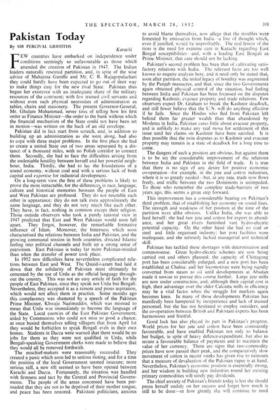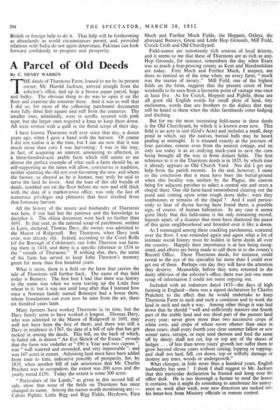Pakistan Today
FEW countries have embarked on independence under conditions seemingly so unfavourable as those which' attended the creation of Pakistan in 1947. The Indian leaders naturally resented partition, and, in spite of the wise advice of Mahatma Gandhi and Mr. C. R. Rajagopalachari they could hardly have been expected to go out of their way to make things easy for the new rival State. Pakistan thus began her existence with an inadequate share of the military resources of the continent; with few trained civil servants and without even such physical necessities of administration as tables, chairs and stationery. The present Governor-General, Mr. Ghulam Muhammad, never tires of telling how his first order as Finance Minister—the order to the bank without which the financial mechanism of the State could not have been set in motion—was written on the back of an old envelope.
Pakistan did in fact start from scratch, and, in addition to building up an administration as she went along, had also to cope with three major problems. In the first place she had to create a united State out of two areas separated by a dis- tance of a thousand miles, with no Polish corridor to connect them. Secondly, she had to face the difficulties arising from the undeniable hostility between herself and her powerful neigh- bour, India. Thirdly, she had to lay the foundations of a sound economy, without coal and with a serious lack of both capital and expertise for industrial development.
On a long-term view the first of these problems is likely to prove the most intractable, for the difference&in race, language, culture and historical memories between the people of East and West Pakistan are profound. They do not resemble each other in appearance; they do not talk even approximately the same language, and they do not very much like each other. They have, in fact, nothing in common except their religion. Those outside observers who took a purely rational view in 1947 predicted that East and West Pakistan would soon fall apart. They forgot, however, the remarkable formative influence of Islam. Moreover, the • bitterness which soon characterised the relations between India and Pakistan, and the growing communal tension in both countries, directed Islamic feeling into political channels and built up a strong sense of patriotism. East Pakistan is today far more Pakistan-minded than when the transfer of power took place.
In 1952 new difficulties have nevertheless complicated rela- tions between East and West. The Quaid-i-azam had laid it down that the solidarity of Pakistan must ultimately be cemented by the use of Urdu as the official language through- out the country. This was not an easy article of faith for the people of East Pakistan, since they speak not Urdu but Bengali. Nevertheless, they accepted it as a remote and pious aspiration, which would not affect them in practice. Some months ago this complacency was shattered by a speech of the Pakistan Prime Minister, Khwaja Nazimuddin, which was misread to mean that Urdu was immediately to become the language of the State. Local enemies of . the East Pakistan Government, aided by Communists who could not miss so good a chance, at once busied themselves telling villagers that from April 1st they would be forbidden to speak Bengali even in their own homes. Students in Dacca were warned that there would be no jobs for them as they were not qualified in Urdu, while Bengali-speaking Government clerks were made to believe that they would all be removed forthwith. The mischief-makers were reasonably successful. They created a panic which soon led to serious rioting, and for a time the position of the local Government seemed insecure; more serious still, a new rift seemed to have been opened between Karachi and Dacca. Fortunately, the situation was handled with firmness and tact by the Central and ,Provincial Govern- ments. The people of the areas concerned have been per- suaded that they are not to be deprived of .their mother tongue, and peace has been restored. Pakistani politicians, anxious to avoid blame themselves, now allege that the troubles were fomented by emissaries from lndia--a line of thought which, even if justified, would be unprofitable. The real lesson of the riots is the need for extreme care in Karachi regarding East Bengal susceptibilities and, with a leading East Bengali as Prime Minister, that care should not be lacking.
Pakistan's second problem has been that of cultivating satis- factory relations with India. The relevant facts are too well known to require analysis here, and it need only be stated that, soon after partition, the initial legacy of hostility was augmented by the Punjab massacres, and that, since the two Governments again obtained physical control of the situation, bad feeling between India and Pakistan has been focussed on the disputes regarding Kashmir, evacuee property and trade relations. Few observers expect Dr. Graham to break the Kashmir deadlock, and still fewer believe that the U.N. will do anything effective if he fails. Since the Hindus who fled from Pakistan left behind them far greater wealth than that abandoned by Moslems in India, Pakistan cares little about evacuee property, and is unlikely to make any real move for settlement of this issue until her claims on Kashmir have been satisfied. It is thus possible that the twin disputes as to Kashmir and evacuee property may remain in a state of deadlock for a long time to come.
The dangers of such a position are obvious, but against them is to be set the considerable improvement of the relations between India and Pakistan in the field of trade. It is true that there is no sign of any desire for positive economic co-operation----for example, in the jute and cotton industries, where it is so greatly needed—but, at any rate, trade now flows freely, and traffic between the two Dominions is unimpeded. To those who remember the complete trade-barriers of two years ago, this seems a great step forward.
This improvement has a considerable bearing on Pakistan's third problem, that of establishing her economy on sound lines. The strength and weakness of her position at the time of the partition were alike obvious. Unlike India, she was able to feed herself; she had raw jute and cotton for export in abund- ance, and her great rivers furnished vast hydro-electric potential capacity. On the other hand she had no coal or steel and little organised industry; her port facilities were inadequate, and she seriously lacked managerial and technical skill.
Pakistan has tackled these shortages with determination and commonsense. Great hydro-electric schemes are now being carried out and others planned; the capacity of Chittagong port has been considerably enlarged, and a new port has been established at Chalna; and her locomotives were being rapidly converted from steam to oil until developments at Abadan made it unwise to pursue this course further. Large jute mills are now under construction, and, although their capital cost is high, their advantage over the older Calcutta mills in efficiency may be a vital factor when the struggle for markets again becomes keen. In many of these developments Pakistan has manifestly been hampered by inexperience and lack of trained personnel, but she has not hesitated to employ outsiders, and the co-operation between British and Pakistani experts has been harmonious and fruitful.
Good luck has also played its part in Pakistan's progress. World prices for her jute and cotton have been consistently favourable, and have enabled Pakistan not only to balance her budget, in spite of heavy defence-expenditure, but also to secure a favourable balance of payments and to maintain the value of her currency. There are signs that raw-commodity prices have now passed their peak, and the comparatively slow movement of cotton in recent weeks has given rise to rumours that a measure of devaluation of the Pakistan rupee is at hand. Nevertheless, Pakistan's economic position is essentially strong, and her wisdom in building new industries round her existing primary commodities will surely pay dividends.
The chief anxiety of Pakistan's friends today is lest she should preen herself unduly on her success and forget how much is still to be done—or how greatly she will continue to need British or foreign help to do it. That help will be forthcoming as abundantly as world circumstances permit, and, provided relations with India do not again deteriorate, Pakistan can look forward confidently to progress and prosperity.



































 Previous page
Previous page